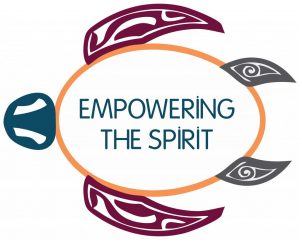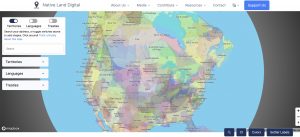As you may remember from my introduction video, I am an avid reader. I enjoy learning through reading so in the course of my research, finding a variety of books by Indigenous authors is very important to me. Not only for my learning but also to bring into my own classroom. I always want to ensure that my classroom library supports a myriad of voices so that students can see themselves as well as those around them in the stories they read. As the saying goes, “representation matters” and the Good Minds Website showcases First Nations, Inuit, and Metis books and authors. They are a family owned business that you can purchase from as well.
Category Archives: MODULE 1
Module 1 – Post 4 – Empowering the Spirit

In my search for resources and websites to support my learning journey, I was introduced to this website through a group project in another course I am taking this term. Empowering the Spirit is a great website as well as teaching tool that helps support true reconciliation. Often times, educators who are also settlers, like myself, lack the knowledge or can be afraid to know where to start when it comes to bringing Indigenous knowledge into our learning environments. This website is a great place to start that journey.
Digital Equity- M1-POST 4
What does digital equity mean? A condition in which there is no digital barrier for any individual or community.
The Quest for Digital Equity (Article, 2018)
What needs to be considered in digital equity? Anything from hardware to digital skills, most importantly infrastructure, connectivity, and literacy.
Exploring the Digital Lives of Youth: Creating Conditions for Digital Equity in Ontario
What does digital equity look like for youth from students’ and teachers’ perspectives?
Indigenous Digital Equity Strategy
An ongoing project to minimize the digital inequity among Indigenous communities.
Can Technology Help to Pass on Indigenous Knowledge? M1- POST 3
I found the following article on how indigenous communities can use technology to share their knowledge, wisdom, and stories with others:
Indigenous peoples teach the world First Nations wisdom through technology
According to this article and UN numbers, more than 476 million Indigenous people live in 90 countries worldwide and account for 6.2% of the global population. The lack of access to technology and digital literacy education, many of them are being left out of the conversation in developing future technologies. To have equitable digital futures, Indigenous people must have a seat at the table in developing these technologies.
“What if you held a device up to a cultural place or an object or an artwork and our elders appeared in holographic format to tell you the story and explain the meaning of that place or object?”
Since the idea was interesting to me, I searched for more information:
Project to use virtual reality technology to teach Nisga’a culture and language (2021)
Anishinaabe artist’s new VR experience takes an Indigenous futurist look at Toronto (2018)
Research team from B.C.’s Camosun College turns The Witness Blanket into virtual reality (2020)
module 1: post 5 – indigenous worldviews
I’m not sure how I came across this video (Youtube algorithm at work perhaps), but it’s called Foundations of Indigenous Worldviews, and it is clear, informative, and rather inspiring:
The speaker, Lewis Cardinal (who is a prominent Indigenous Canadian – I was surprised I hadn’t hear of him), discusses living in relationship not only with other people, but with other beings. He says Indigenous peoples don’t put themselves at the centre of the circle.
With my new understanding of ‘root metaphors’, what I took from this video is that the circle is a root metaphor for Indigenous worldviews. We are all part of a whole.
Key quotes:
“Each person, family and nation is unique and has much to offer.”
“The individual needs the community and the community needs the individual.”
module 1: post 4 – language contains thought patterns
My fourth ‘finding’ for this module is a video of Chet Bowers at the 2015 Economics of Happiness conference, held in Portland, Oregon. Since we’ve been reading Bowers, but I don’t currently have time to read his book, Let Them Eat Data, I did a quick Youtube search a few days ago and found this mind-blowing 16-minute video:
Here are the notes I made while watching/listening (anything in quotes is directly from the video, everything else is my paraphrasing and interpretation):
- We have an anthropocentric, European, Enlightenment, abstract way of thinking…
- This way of thinking doesn’t value the cultural commons and the traditions of local, non-monetized, inter-generational, sustainable activities…
- “What we need is a more complex form of cultural intelligence” that “pays attention to the patterns that connect”
- How do various forms of knowledge (ways of knowing/epistemologies) affect our behaviour?
- It’s not either/or. Print and data are not bad. But they are limited. They don’t capture everything. We need to stop thinking that what is in print or in the form of data is objective. Print and data can’t provide or contain contextual and relational knowledge and experience.
- Language contains thought patterns. Every language and culture has specific “root metaphors” (I had to Google what root metaphors are). Our culture has a strong root metaphor about progress.
- “We need to look at the process of linguistic colonization of our present by our past.”
Wow. I highly recommend this video. He starts a little slow, but then it ends up being a PACKED 16 minutes.
Module 1: Post 3 – wisdom of belonging
For a previous MET course, I watched this video about the Circle of Courage:
If you haven’t seen it, it’s worth watching. The speaker describes Indigenous ways of teaching as involving: Generosity, Belonging, Independence, and Mastery. It’s a really beautiful talk and related to, but a bit different from, the First People’s Principles of Learning.
This video really stuck with me, so I looked up the speaker, Martin Brokenleg, and read the articles on his website.
I especially liked the article “Native American Wisdom on Belonging.” In it, Brokenleg writes, “Belonging is the organizing principle in Partnership cultures. Significance is assured by belonging, whereas in Dominator cultures one gains significance by stand ing out from the others, as seen in the hyperindividualism of U.S. society today.”
I really think I want to focus on individualism vs collective for my research project, but I may need to narrow down that huge topic a tiny bit… We’ll see. 🙂
Module 1 – Post 3: Native Land

A large part of my learning this module when it comes to Indigenous knowledge is understanding place. As I have blogged about previously, the CBC website that shows the map of residential schools has been helpful for me in understanding where I am and the histories that have taken place on the land.
Another important part of understanding the land is looking at Indigenous territories and languages that are spoken on these territories as well as exploring the treaties on this land. The Native Land website provides an interactive map that allows me to continue my exploration and further my knowledge.
Module 1: Post 4 – Davin School Renaming
This article has personal meaning as I taught during one of my internships in my undergraduate program at the University of Regina at this school. The newly named The Crescents School is located near downtown Regina and was previously named Davin School. At the time of my internship, I did not understand who the school was named after, and did not know about Davin’s impact on Indigenous Peoples across the country.
This news article resonated with me because of the readings of Hare (2011) and the Lee Brown video and the brief discussion of Nicholas Davin who played a significant role in creating residential schools. The article discusses how Davin Elementary School was renamed 4 years ago to The Crescents School. It was not until July 2022, that the masonry bearing the name “Davin School” was removed from the building.
In the module 1 readings, we discuss the colonial impact of Western education and the importance of including ancestral knowledge, culture, and making learning relevant for Indigenous students. The article serves as a reminder for me of the work that needs to be done and the steps towards reconciliation that we need to take.
https://globalnews.ca/news/9017743/the-crescents-school-regina-davin-removed/

Module 1: Post 3 – Indigenous Friends Association
Indigenous Friends Association (IFA) is an Indigenous-Led tech not-for-profit organization that aligns closely with the discussions of Module 1. IFA responds to the Calls to Action #7 and #66, and aims to provide Indigenous Peoples and allies with the tools to build partnerships and promote digital projects that are rooted around Indigenous Ways of Knowing and Understandings.
Two programs which IFA has are the Indigital program aimed at promoting wellness and technology education through Indigenous Worldviews. As well as the IndigiMobile Program. This program incorporates imagining, creating and deploying digital applications that integrate traditional knowledge and values.
Here is an interview with one of the allies that discuss how they created a Social Media App Indigenous Friends that connected Indigenous people.
https://www.indigenousfriends.org/